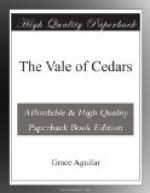Knowing this, her sole prayer, her sole effort was to obtain mental strength sufficient under every temptation, either from severity or kindness, to adhere unshrinkingly to the faith of her fathers—to cling yet closer to the love of her Father in heaven, and endeavor, with all the lowly trust and fervid feelings of her nature, to fill the yearning void within her woman’s heart with his image, and so subdue every human love. It seemed to her vivid fancy as if all the misfortunes she had encountered sprung from her first sin—that of loving a Nazarene. Hers was not the age to make allowances for circumstances in contradistinction to actual deeds. Then, as unhappily but too often now, all were sufferings from a misplaced affection—sprung, not from her fault, but from the mistaken kindness which it exposed her to without due warning of her danger. Educated with the strong belief, that to love or wed, beyond the pale of her own people was the greatest sin she could commit, short of actual apostacy, that impression, though not strong enough, so to conquer human nature, as to arm against love, returned with double force, as sorrow after sorrow gathered round her, and there were none beside her to whisper and strengthen, with the blessed truth that God afflicts yet more in mercy than in wrath; and that his decrees, however fraught with human anguish, are but blessings in disguise—blessings, sown indeed with tears on earth, to reap their deathless fruit in heaven.
But though firmly believing all her suffering was deserved, aware that when she first loved Arthur, the rebel-thought—“Why am I of a race so apart and hated?” had very frequently entered her heart, tempting her at times with fearful violence to give up all for love of man; yet Marie knew that the God of her fathers was a God of love, calling even upon the greatest sinner to return to him repentant and amending, and that even as a little child such should be forgiven. He had indeed proclaimed himself a jealous God, and would have no idol-worship, were it by wood or stone, or, far more dangerous, of human love; and she prayed unceasingly for strength to return to Him with an undivided heart, even if to do so demanded not only separation from Stanley—but a trial in her desolate position almost as severe—the loss of Isabella’s confidence and love.
Few words passed between Marie and her guardians; their manner was kind and gentle, but intercourse between rigid Catholics and a proclaimed Jewess, could not be other wise than restrained. From the time that reason returned, the Queen had not visited her, doing actual violence to her own inclinations from tire mistaken—but in that age and to her character natural—dread that the affection and interest she felt towards Marie personally, would lessen the sentiments of loathing and abhorrence with which it was her duty to regard her faith. Isabella had within herself all the qualifications of a martyr. Once impressed that it was a religious duty, she would




